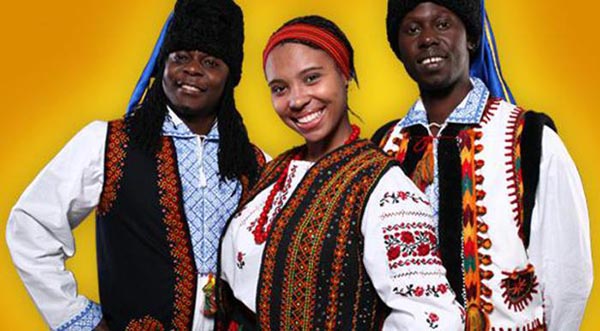They arrived on scholarships from mostly West African countries because it was very easy and cheap to study in UA/USSR. Back in the Soviet times, some of them had relations with local women and left mixed children behind.
Their integration has been painful, but they have succeeded by and large. They did so by not resorting to Black Power and by not teaching their culture to the locals. They did so by trying to integrate and assimilate and support the country.
Initially, the attitude of most locals to them was that of fear and shunning ( kind of the way many Asians view foreigners). There were also some robberies and violence against them. The police did not care about them much. Things were not as bad as in Russia, but also not terribly good.
The skinhead movement came from the West and raged for a while in the 1990ies. The harassed blacks, Tatars, Gypsies and other dark skinned people.
Then, Amnesty international got involved ( as well as other NGO's) and pushed the government to jail the skinheads.
Reluctantly at first, they began catching them and giving them prison sentences. Ukraine has a law against hate crime ( or rather fomenting inter-ethnic hatred and animosity) and they began enforcing it after many visits by NGOs and EU leaders.
Hate crime went down. But the blacks were still shunned socially, by and large. Some people were nice to them, but not most. Night clubs in many cities would still not let them in. They had hard time making friends.
The response by Africans was not to leave, but to stay and to come in even bigger numbers-- and to go native. They started dressing up in Ukrainian ethnic clothes, supporting all kinds of Ukrainian ethnic events and parades and singing Ukrainian songs at social functions. They became fluent in the local language ( which even many Ukrainians cannot speak well).
One African even applied to be accepted into a Cossack regiment.
Now, they hit the soft spot. The Ukrainians, whose culture and language had been repressed for centuries were amazed. The Cossack regiment accepted the African into its ranks with disbelief. They never expected someone like that to apply.
The overall social response was of huge surprise, and then, admiration and applause. They started inviting such Africans onto TV shows and broadcasting the message: "Look at them- they are supporting and respecting our culture- they are the only ones ( and it was true)" in the world who do that. The admiration spread to the mixed kids, and they were now treated much better.
Images of black people on TV dressed in embroidered shirts singing traditional songs endeared the public so much that doors began to open. Plus, time also played a role. People started getting used to them and seeing that they were, basically, alright. These Africans were mostly people who were just studying. They were not immigrants expecting handouts.
Now, these black people were becoming part of the landscape.

The final blow to anti black prejudice was that during the events of the past year and a half, the black people supported Ukraine. The message now was- "any black is worth more respect and is better than a Russian. These learn our language ( which the Russians almost never do); they support and respect our culture ( which the Russians also almost never do, either).

When I was in Dnipropetrovsk, I saw black people walking together with local Slavs, all chatting and laughing. Things are definitely looking up for them there. Mixed kids are also being treated better and better. The term Afro-Ukrainian has been coined.
A Nigerian opened up a church and began preaching. He attracted a huge following.

Integration is never a smooth process, and there's plenty of work still to be done, but they are definitely over the hump now.





